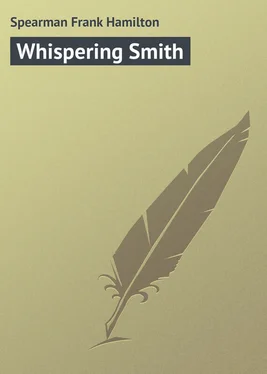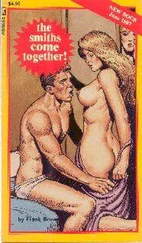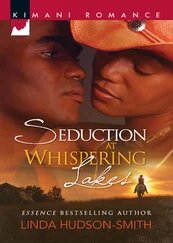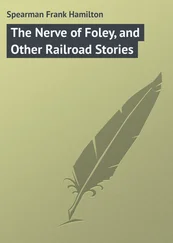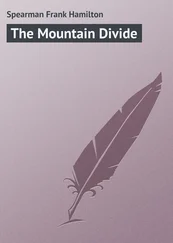Frank Spearman - Whispering Smith
Здесь есть возможность читать онлайн «Frank Spearman - Whispering Smith» — ознакомительный отрывок электронной книги совершенно бесплатно, а после прочтения отрывка купить полную версию. В некоторых случаях можно слушать аудио, скачать через торрент в формате fb2 и присутствует краткое содержание. Жанр: foreign_prose, foreign_adventure, на английском языке. Описание произведения, (предисловие) а так же отзывы посетителей доступны на портале библиотеки ЛибКат.
- Название:Whispering Smith
- Автор:
- Жанр:
- Год:неизвестен
- ISBN:нет данных
- Рейтинг книги:3 / 5. Голосов: 1
-
Избранное:Добавить в избранное
- Отзывы:
-
Ваша оценка:
- 60
- 1
- 2
- 3
- 4
- 5
Whispering Smith: краткое содержание, описание и аннотация
Предлагаем к чтению аннотацию, описание, краткое содержание или предисловие (зависит от того, что написал сам автор книги «Whispering Smith»). Если вы не нашли необходимую информацию о книге — напишите в комментариях, мы постараемся отыскать её.
Whispering Smith — читать онлайн ознакомительный отрывок
Ниже представлен текст книги, разбитый по страницам. Система сохранения места последней прочитанной страницы, позволяет с удобством читать онлайн бесплатно книгу «Whispering Smith», без необходимости каждый раз заново искать на чём Вы остановились. Поставьте закладку, и сможете в любой момент перейти на страницу, на которой закончили чтение.
Интервал:
Закладка:
“Thank you, I’m done.”
“But you haven’t eaten anything. Isn’t your steak right?”
“It’s fine, but that man–well, you know how I like him and how he likes me. I’ll content myself with digesting my temper.”
CHAPTER VIII
SMOKY CREEK BRIDGE
It was not alone that a defiance makes a bad dinner sauce: there was more than this for McCloud to feed on. He was forced to confess to himself as he walked back to the Wickiup that the most annoying feature of the incident was the least important, namely, that his only enemy in the country should be intrusted with commissions from the Stone Ranch and be carrying packages for Dicksie Dunning. It was Sinclair’s trick to do things for people, and to make himself so useful that they must like first his obligingness and afterward himself. Sinclair, McCloud knew, was close in many ways to Lance Dunning. It was said to have been his influence that won Dunning’s consent to sell a right of way across the ranch for the new Crawling Stone Line. But McCloud felt it useless to disguise the fact to himself that he now had a second keen interest in the Crawling Stone country–not alone a dream of a line, but a dream of a girl. Sitting moodily in his office, with his feet on the desk, a few nights after his encounter with Sinclair, he recalled her nod as she said good-by. It had seemed the least bit encouraging, and he meditated anew on the only twenty minutes of real pleasurable excitement he had ever felt in his life, the twenty minutes with Dicksie Dunning at Smoky Creek. Her intimates, he had heard, called her Dicksie, and he was vaguely envying her intimates when the night despatcher, Rooney Lee, opened the door and disturbed his reflections.
“How is Number One, Rooney?” called McCloud, as if nothing but the thought of a train movement ever entered his head.
Rooney Lee paused. In his hand he held a message. Rooney’s cheeks were hollow and his sunken eyes were large. His face, which was singularly a night face, would shock a stranger, but any man on the division would have given his life for Rooney. The simple fellow had but two living interests–his train-sheets and his chewing tobacco. Sometimes I think that every railroad man earns his salary–even the president. But Rooney was a Past Worthy Master in that unnumbered lodge of railroad slaves who do killing work and have left, when they die, only a little tobacco to show for it. It was on Rooney’s account that McCloud’s order banishing cuspidors from his office had been rescinded. A few evenings of agony on the despatcher’s part when in consultation with his chief, the mournful wandering of his uncomplaining eyes, his struggle to raise an obstinate window before he could answer a question, would have moved a heart harder than McCloud’s. The cuspidor had been restored to one corner of the large room, and to this corner Rooney, like a man with a jaw full of birdshot, always walked first. When he turned back to face his chief his face had lost its haunted expression, and he answered with solemn cheer, “On time,” or “Fourteen minutes late,” as the case might be. This night his face showed something out of the ordinary, and he faced McCloud with evident uneasiness. “Holy smoke, Mr. McCloud, here’s a ripper! We’ve lost Smoky Creek Bridge.”
“Lost Smoky Creek Bridge?” echoed McCloud, rising in amazement.
“Burned to-night. Seventy-seven was flagged by the man at the pump station.”
“That’s a tie-up for your life!” exclaimed McCloud, reaching for the message. “How could it catch fire? Is it burned up?”
“I can’t get anything on that yet; this came from Canby. I’ll have a good wire in a few minutes and get it all for you.”
“Have Phil Hailey and Hyde notified, Rooney, and Reed and Brill Young, and get up a train. Smoky Creek Bridge! By heavens, we are ripped up the back now! What can we do there, Rooney?” He was talking to himself. “There isn’t a thing for it on God’s earth but switchbacks and five-per-cent. grades down to the bottom of the creek and cribbing across it till the new line is ready. Wire Callahan and Morris Blood, and get everything you can for me before we start.”
Ten hours later and many hundreds of miles from the mountain division, President Bucks and a companion were riding in the peace of a June morning down the beautiful Mohawk Valley with an earlier and illustrious railroad man, William C. Brown. The three men were at breakfast in Brown’s car. A message was brought in for Bucks. He read it and passed it to his companion, Whispering Smith, who sat at Brown’s left hand. The message was from Callahan with the news of the burning of Smoky Creek Bridge. Details were few, because no one on the West End could suggest a plausible cause for the fire.
“What do you think of it, Gordon?” demanded Bucks bluntly.
Whispering Smith seemed at all times bordering on good-natured surprise, and in that normal condition he read Callahan’s message. Everything surprised Whispering Smith, even his salary; but an important consequence was that nothing excited him. He seemed to accommodate himself to the unexpected through habitual surprise. It showed markedly in his eyes, which were bright and quite wide open, and, save for his eyes, no feature about him would fix itself in the memory. His round, pleasant face, his heavy brown mustache, the medium build that concealed under its commonplace symmetry an unusual strength, his slightly rounding shoulders bespeaking a not too serious estimate of himself–every characteristic, even to his unobtrusive suit and black hat, made him distinctly an ordinary man–one to be met in the street to-day and passed, and forgotten to-morrow.
He was laughing under Bucks’s scrutiny when he handed the message back. “Why, I don’t know a thing about it, not a thing; but taking a long shot and speaking by and far, I should say it looks something like first blood for Sinclair,” he suggested, and to change the subject lifted his cup of coffee.
“Then it looks like you for the mountains to-night instead of for Weber and Fields’s,” retorted Bucks, reaching for a cigar. “Brown, why have you never learned to smoke?”
CHAPTER IX
THE MISUNDERSTANDING
No attempt was made to minimize the truth that the blow to the division was a staggering one. The loss of Smoky Creek Bridge put almost a thousand miles of the mountain division out of business. Perishable freight and time freight were diverted to other lines. Passengers were transferred; lunches were served to them in the deep valley, and they were supplied by an ingenuous advertising department with pictures of the historic bridge as it had long stood, and their addresses were taken with the promise of a picture of the ruins. Smoky Creek Bridge had long been famous in mountain song and story. For one generation of Western railroad men it had stood as a monument to the earliest effort to conquer the Rockies with a railroad. Built long before the days of steel, this high and slender link in the first transcontinental line had for thirty years served faithfully at its danger-post, only to fall in the end at the hands of a bridge assassin; nor has the mystery of its fate ever completely been solved, though it is believed to lie with Murray Sinclair in the Frenchman hills. The engineering department and the operating department united in a tremendous effort to bring about a resumption of traffic. Glover’s men, pulled off construction, were sent forward in trainloads. Dancing’s linemen strung arc-lights along the creek until the canyon twinkled at night like a mountain village, and men in three shifts worked elbow to elbow unceasingly to run the switchbacks down to the creek-bed. There, by cribbing across the bottom, they got in a temporary line.
Читать дальшеИнтервал:
Закладка:
Похожие книги на «Whispering Smith»
Представляем Вашему вниманию похожие книги на «Whispering Smith» списком для выбора. Мы отобрали схожую по названию и смыслу литературу в надежде предоставить читателям больше вариантов отыскать новые, интересные, ещё непрочитанные произведения.
Обсуждение, отзывы о книге «Whispering Smith» и просто собственные мнения читателей. Оставьте ваши комментарии, напишите, что Вы думаете о произведении, его смысле или главных героях. Укажите что конкретно понравилось, а что нет, и почему Вы так считаете.
